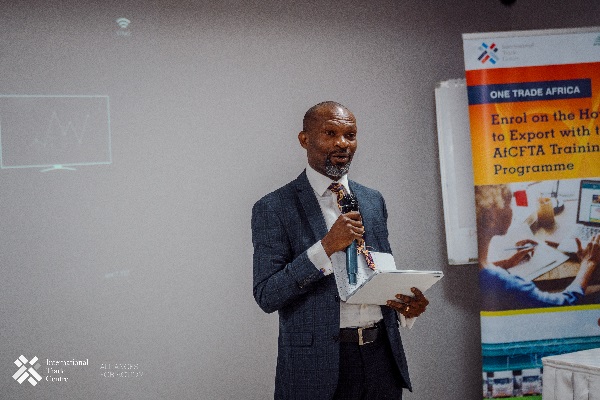
Private sector urged to capitalise on AfCFTA opportunities
THE Manager of Client Relations for Anglophone West Africa at Afreximbank, Wisdom Tawiah, has underscored the urgent need for private sector engagement to realise the full potential of the African Continental Free Trade Area (AfCFTA).
The World Bank projects that a ‘’successful implementation of the AfCFTA would boost the region’s income by $450 billion by 2035, raise exports by $560 billion, boost wages by 10.3% for unskilled workers and 9.8% for skilled workers, and lift 30 million people out of extreme poverty while driving wage growth for women’.”
According to him, if these projections are to be met, the private sector must act swiftly.
“We are now 11 years away from these projections and if these metrics are to be a reality, the time for active private sector participation to take advantage of the opportunities offered by the AfCFTA is now.
Whereas governments, through policy, create the enabling environment for businesses to thrive, the primary engine or conduit that will drive and deliver market expansion, jobs creation and innovation acceleration that the AfCFTA is envisaged to promote will be the private sector,” he said.
Workshop
Mr Tawiah made the call at the opening of a two-day workshop dubbed: “How to Export with the AfCFTA” for small and medium-sized enterprises (SMEs) in the cocoa and coffee value chains in Accra on Thursday.
The workshop was organised by the International Trade Centre (ITC) through its One Trade Africa Initiative, Alliances for Action (A4A) programme in Ghana and SME Trade Academy together with the African Export-Import Bank (Afreximbank) and ECOWAS Commission.
It aimed to support the operationalization of the AfCFTA and enable participating enterprises to assess their position concerning these opportunities and determine how they will take advantage of what the AfCFTA has to offer.
Recommendations
He urged businesses to actively participate in AfCFTA-related initiatives, such as the Guided Trade Initiatives and other tools offered by the AfCFTA Secretariat.
"Setting up these desks will provide a structured approach to managing AfCFTA-related information and ensure that companies are well-positioned to make informed decisions.
Further, business associations should intensify their efforts to create awareness of the current trade and investment opportunities in AfCFTA and to connect businesses, not only to funding opportunities in value chains but also to regional businesses (B2B approach),” he stated.
By following these recommendations, Mr Tawiah believes the private sector can effectively leverage AfCFTA opportunities to drive growth and innovation across the continent.
Commitment
“As a Pan-African multilateral financial institution mandated to finance and promote intra-and extra-African trade, we remain committed, through our range of finance options and trade facilitation initiatives, to continue promoting, financing and facilitating intra-African trade and harnessing the full scope of the AfCFTA with multiplier effects for economies of African countries.
I encourage you to take full advantage of this event to position Ghana and Ghanaian businesses as major beneficiaries of the opportunities presented by the AfCFTA,” he said.
Navigating complexities
The National Coordinator for Alliance for Action Programmes at ITC, Larry Attipoe, explained that his outfit was focused on helping SMEs join global value chains by removing barriers and providing practical tools, especially in light of the African Continental Free Trade Area.
“ITC's interventions aim to build the capacity among SMEs, to ensure they are well-prepared to effectively navigate the complexities of international trade. We strive to remove barriers that SMEs face, and one such effort is this workshop. With the AfCFTA providing new opportunities for cross-border trade, it is essential for SMEs to understand the rules and procedures,” he said.
Building capacity
For his part, the Programme Manager for Enterprise Support and Trade in Finance at the National AfCFTA Coordination Office, Divine Kutorste, said the AfCFTA presents a tremendous opportunity for Ghana, with projections indicating a potential 94% increase in exports to African markets.
Therefore, he said, it was crucial to focus on businesses engaging in trade under the agreement.
“One key step is providing capacity building to these businesses because to trade legally under AfCFTA, businesses must understand and follow due processes.
The agreement aims to remove duties and reduce non-tariff barriers, however, traders need to know the processes, understand the agreement, and enhance their capacity to identify and penetrate new markets,” he stated.
